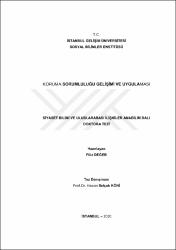| dc.contributor.author | Değer, Filiz | |
| dc.date.accessioned | 2020-06-16T22:34:29Z | |
| dc.date.available | 2020-06-16T22:34:29Z | |
| dc.date.issued | 2020 | en_US |
| dc.date.submitted | 2020-01-09 | |
| dc.identifier.uri | https://hdl.handle.net/11363/2216 | |
| dc.description | Danışman: PROF. DR. HASAN SELÇUK KÖNİ
Yer Bilgisi: İstanbul Gelişim Üniversitesi / Sosyal Bilimler Enstitüsü / Siyaset Bilimi ve Uluslararası İlişkiler Anabilim Dalı
Konu: Uluslararası İlişkiler = International Relations | en_US |
| dc.description.abstract | Devletlerin vatandaşlarını soykırım, savaş suçları, insanlığa karşı suçları ve etnik temizlik suçlarına karşı koruyamadığı, korumakta isteksiz davrandığı ya da kendi vatandaşlarına karşı şiddet uyguladığı durumlarda egemenlikten kaynaklanan sorumluluk açığı bulunmaktadır. Bu açık koruma sorumluluğu kavramının ortaya çıkmasıyla birlikte müdahale yetkisinin uluslararası topluma verilmesiyle kapatılmaya çalışılmıştır. Egemenlik kavramı nüfusun iç savaş, isyan, baskı ya da devletin başarısızlığı sonucu ciddi bir zarara uğradığı ve hükümetin durumu kontrol altına almada başarısız olduğu durumlarda yerini sorumluluk olarak egemenlik' kavramına bırakmıştır. Devletin üzerinde tam ve mutlak hâkimiyeti olduğu ülke topraklarından ayrı tutulan insanların, salt egemenliğin bir parçası olmayacağı anlayışı uluslararası antlaşmalar ile geliştirilmiştir. Üç aşamalı bir yapı üzerine kurulu bu sorumluluk "insani müdahale" gibi zorlayıcı tedbirleri içermekte, "insani müdahale"den farklı olarak "önleyici diplomasi" ve "yeniden inşa" sorumluluklarını da uluslararası topluma yüklemektedir.Koruma sorumluluğunun varlığının kabul edilmesiyle birlikte, uluslararası barış ve güvenliği sağlama konusunda birincil derecede yetkili uluslararası aktör olan Birleşmiş Milletler Güvenlik Konseyi'nin norm uygulayıcısı olarak uluslararası barış ve güvenliğin tehdidi dışında bir sebeple ilgili devletin rızası olmadan egemenliğine müdahale etme yetkisinin olduğu kabul edilmiştir. Ancak normun uygulaması aşamasında üç sütunlu yapıda öngörülen sıraya riayet edilmemesi, müdahalenin insani koruma amacı dışında doğrudan bir devletin siyasi bütünlüğüne ve bağımsızlığına müdahale şeklinde gerçekleşmesi, müdahalenin son çare olması ilkesine uyulmaması ve uygulamadaki istikrarsızlık normun gelişimini sekteye uğratmıştır. Bu çalışmada, uluslararası toplumun koruma sorumluluğu adı altında ilk zorlayıcı müdahalesi olma özelliğine sahip olan Libya müdahalesi ile benzer iç çatışmalara sahne olan Suriye hakkında Güvenlik Konseyi'nin 2011'den günümüze almış olduğu kararların nitel içerik analizi yapılmıştır. Bu analiz sayesinde koruma sorumluluğu normunun uygulanış şekli, uluslararası hukuk normlarına uygunluğu, uluslararası pratiğin tutarsızlığının nedenleri ve küresel sistem düzeyinde P5'in aralarındaki güç ilişkilerinin normun uygulanmasına yansıması irdelenmiştir. Sonuç olarak bir devlette insani krizin ortaya çıktığı olaylarda yetkili otorite tarafından yapılacak olası bir müdahalenin amacının "norm mu? egemenlik mi?" olduğu sorunsalı uluslararası ilişkiler teorileri ve uluslararası hukuk kuralları çerçevesinde değerlendirilmiştir. | en_US |
| dc.description.abstract | There is a lack of responsibility for sovereignty when states cannot protect their citizens against genocide, war crimes, crimes against humanity and ethnic cleansing, or are reluctant to protect them or use violence against their own citizens. With the emergence of this concept of open responsibility for protection, it has been tried to be closed by giving the intervention authority to the international community. The concept of sovereignty has been replaced by the concept of sovereignty as responsibility where the population has suffered serious damage as a result of civil war, rebellion, repression or failure of the state and the government has failed to control the situation. The understanding that the people who are separated from the territory of the country where the state has full and absolute sovereignty will not be a part of pure sovereignty has been developed by international treaties. This responsibility, which is based on a three-stage structure, includes coercive measures such as humanitarian intervention, and, unlike "humanitarian intervention" imposes"preventive diplomacy"and" reconstruction "responsibilities on the international community. With the recognition of the responsibility of protection, international peace and security As the norm enforcer of the United Nations Security Council, which is the primary international actor competent to provide, it is recognized that it has the authority to intervene in the sovereignty of the state without the consent of the relevant state for a reason other than the threat of international peace and security. However, failure to comply with the order envisaged in the three-pillar structure during the implementation of the norm, the fact that the intervention took place in the form of an intervention directly to the political integrity and independence of a state other than the purpose of human protection, the non-compliance with the principle of being the last resort of the intervention and the instability in practice interrupted the development of the norm. In this study, the qualitative content analysis of the decisions taken by the Security Council since 2011, which has witnessed similar internal conflicts with the Libya intervention, which is the first coercive intervention under the name of protection responsibility of the international community, has been conducted. With this analysis, the application of protection responsibility norm, compliance with international norms of law, the reasons of inconsistency of international practice and the reflection of the power relations between P5 on the implementation of the norm at global system level were examined. As a result, the question of whether a possible intervention by the competent authority in the events of humanitarian crisis in a state is 'norm or sovereignty? It has been evaluated within the framework of international relations theories and international law rules. | en_US |
| dc.language.iso | tur | en_US |
| dc.publisher | İstanbul Gelişim Üniversitesi Sosyal Bilimler Enstitüsü | en_US |
| dc.rights | info:eu-repo/semantics/openAccess | en_US |
| dc.rights | Attribution-NonCommercial-NoDerivs 3.0 United States | * |
| dc.rights.uri | http://creativecommons.org/licenses/by-nc-nd/3.0/us/ | * |
| dc.subject | Koruma Sorumluluğu | en_US |
| dc.subject | Birleşmiş Milletler Güvenlik Konseyi | en_US |
| dc.subject | İnsancıl Hukuk | en_US |
| dc.subject | Libya | en_US |
| dc.subject | Suriye | en_US |
| dc.subject | Responsibility to Protect | en_US |
| dc.subject | United Nations Security Council | en_US |
| dc.subject | Humanitarian Law | en_US |
| dc.subject | Libya | en_US |
| dc.subject | Syria | en_US |
| dc.title | Koruma sorumluluğu gelişimi ve uygulaması | en_US |
| dc.title.alternative | Development and implementation of protection responsibility | en_US |
| dc.type | doctoralThesis | en_US |
| dc.department | Sosyal Bilimler Enstitüsü | en_US |
| dc.relation.publicationcategory | Tez | en_US |



















